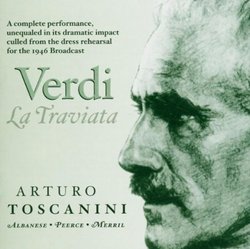| All Artists: Verdi, Toscanini Title: Toscanini Conducts Verdi's La Traviata Members Wishing: 0 Total Copies: 0 Label: Music & Arts Program Original Release Date: 1/1/2006 Release Date: 1/1/2006 Genre: Classical Style: Opera & Classical Vocal Number of Discs: 2 SwapaCD Credits: 2 UPC: 017685427121 |
Search - Verdi, Toscanini :: Toscanini Conducts Verdi's La Traviata
 | Verdi, Toscanini Toscanini Conducts Verdi's La Traviata Genre: Classical
|
Larger Image |
CD Details |
CD ReviewsToscanini's La Traviata Robert E. Nylund | Ft. Wayne, Indiana United States | 01/12/2006 (5 out of 5 stars) "For definitive interpretation, Arturo Toscanini's recording of Verdi's "La Traviata" is one of the best ever. He assembled a very fine cast for these broadcast concerts in NBC Studio 8-H in 1946. Fortunately, the two concerts that included the entire opera, were preserved by RCA Victor technicians, working with remarkably good resources for the time. NBC routinely recorded all of Toscanini's broadcasts, from December 25, 1937, to April 4, 1954, using the best possible technology. Initially, the broadcasts were recorded on the large transcription discs used for many radio broadcasts, both at 33-1/3 rpm and at 78 rpm. Later, magnetic tape was used. I do not know the original sources for the recordings, but the sound was especially good. Often NBC Studio 8-H was known for rather dull sound; however, technicians developed techniques for achieving better results in microphone placement and these 1946 broadcasts are an outstanding example. Licia Albanese really enjoyed working with Toscanini and she was one of the artists who was interviewed years later for RCA Victor's wonderful video tribute to the Maestro. She seldom sang as well as she did for Toscanini, both in this recording of "La Traviata" and in the 1946 broadcast concerts of Puccini's "La Boheme." The sheer beauty of Albanese's singing is breathtaking. The Maestro was able to get her sing with not only great beauty and precision but with wonderful feeling. Robert Merrill, also interviewed for the video tribute, recalled how Toscanini helped him with a difficult passage during rehearsals. The Maestro tapped the beat of the music on Merrill's head! He sang particularly well in these performances. All of the singers responded well to Toscanini's leadership and it is a real joy to listen to them. There is deep emotion in the work, beginning with the rousing drinking song that so many singers and music-lovers enjoy. By the end of the opera, as Violetta dies of consumption (turberculosis), we can feel the full tragedy of the story, wonderfully conveyed by Verdi from the original French story. This is but one of seven complete operas that Toscanini performed with the NBC Symphony Orchestra; fortunately, they were all preserved in recordings. It is also one of the greatest performances of Verdi's masterpiece. " The "possessed" Traviata madamemusico | Cincinnati, Ohio USA | 08/09/2007 (5 out of 5 stars) "Arturo Toscanini prepared six complete operas for broadcast with the NBC Symphony: Beethoven's "Fidelio" and five operas of Verdi. The actual broadcast performance of this "Traviata," on Dec. 1 & 8, 1946, was stiff, nervous-sounding and expressionless as far as the singers were concerned.
This dress rehearsal, culled from one day before each of the broadcasts, shows why. Toscanini had his orchestra and singers performing at such a high fever-pitch of emotion that they couldn't possibly have done as well one day later. The first two acts, in particular, are more relaxed and expressive than anything in the broadcast, but even in the last act Licia Albanese is much more in touch with her character than she was on the air. One wonders why Toscanini, hearing the two versions, did not insist on RCA including at least some excerpts from the rehearsal for the broadcast. Of course, some sections could not have been included, because you can hear the Maestro happily singing and humming along, especially in the Act Two soprano-baritone duet, as he simultaneously gave instructions. But wow, what a difference one day makes. The broadcast "Traviata" issued by RCA-BMG is pretty good but flawed; this "Traviata" seems possessed. In act 2, for instance, Albanese usually connected the long-held not on "Ah!" to the beginning of "Dite alla giovine." She cannot do so here because she is singing much more intensely from a dramatic aspect. She, too, was possessed. A must-hear for any serious opera lover. Only the Carlos Kleiber studio recording has an overall impact as great as this." |

 Track Listings (10) - Disc #1
Track Listings (10) - Disc #1